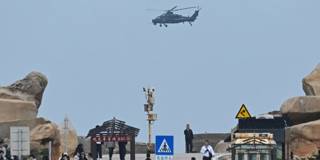When US President Joe Biden was asked last September whether American forces would defend Taiwan from a Chinese attack, he replied in the affirmative, but included a caveat: “if, in fact, there was an unprecedented attack.” But an “unprecedented attack” is precisely what Chinese President Xi Jinping is likely to avoid.
NEW DELHI – The more US President Joe Biden’s administration has sought to ease tensions with China through high-level dialogue, the more brazenly Chinese President Xi Jinping has applied coercive pressure to Taiwan. Never was this pattern more obvious than late last month, when China sent 33 warplanes and seven combat ships toward Taiwan, just as Chinese Foreign Minister Wang Yi and US National Security Adviser Jake Sullivan were holding talks in Bangkok. Fears that Xi will soon launch an even more overt push for “reunification” with Taiwan are rising.
Taiwan was never part of the People’s Republic of China. It is a self-governing island that, for most of its history, had no relationship with China and has remained fully outside Chinese control for the last 129 years. Even so, Xi has made no secret of his intention to enforce China’s claim to the island. In fact, Xi has called “reunification” with Taiwan his “historic mission.”
Xi reportedly reaffirmed his intentions to Biden at their recent summit in San Francisco, noting that the only matter left to be decided is when to take over the island. And there are good reasons to believe that the time might be near. With the wars in Ukraine and Gaza claiming America’s attention and resources, and the world undergoing a broader geopolitical reconfiguration, Xi might see a window of opportunity. And Taiwanese voters’ delivery of a third consecutive presidential term to the pro-sovereignty Democratic Progressive Party has likely bolstered Xi’s motivation to assert control over the island.

NEW DELHI – The more US President Joe Biden’s administration has sought to ease tensions with China through high-level dialogue, the more brazenly Chinese President Xi Jinping has applied coercive pressure to Taiwan. Never was this pattern more obvious than late last month, when China sent 33 warplanes and seven combat ships toward Taiwan, just as Chinese Foreign Minister Wang Yi and US National Security Adviser Jake Sullivan were holding talks in Bangkok. Fears that Xi will soon launch an even more overt push for “reunification” with Taiwan are rising.
Taiwan was never part of the People’s Republic of China. It is a self-governing island that, for most of its history, had no relationship with China and has remained fully outside Chinese control for the last 129 years. Even so, Xi has made no secret of his intention to enforce China’s claim to the island. In fact, Xi has called “reunification” with Taiwan his “historic mission.”
Xi reportedly reaffirmed his intentions to Biden at their recent summit in San Francisco, noting that the only matter left to be decided is when to take over the island. And there are good reasons to believe that the time might be near. With the wars in Ukraine and Gaza claiming America’s attention and resources, and the world undergoing a broader geopolitical reconfiguration, Xi might see a window of opportunity. And Taiwanese voters’ delivery of a third consecutive presidential term to the pro-sovereignty Democratic Progressive Party has likely bolstered Xi’s motivation to assert control over the island.